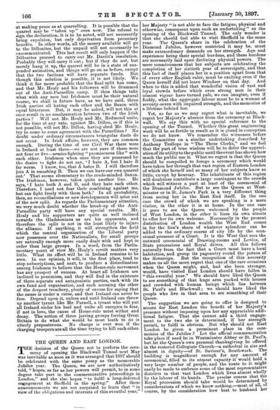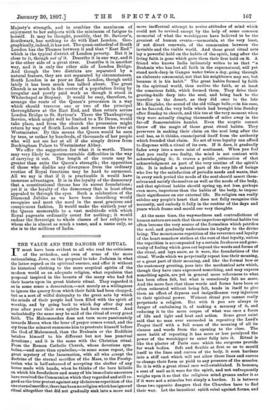THE QUEEN AND EAST LONDON.
decision of the Queen not to perform the cere- mony of opening the Blackwall Tunnel next May was inevitable as soon as it was arranged that 1897 should be celebrated with the same pomp as the memorable Jubilee year. The Queen, we are now authoritatively told, "hopes, as far as her powers will permit, to in some degree take part in the commemorative proceedings in London," and she also hopes "to fulfil a long-deferred engagement at Sheffield in the spring." After these announcements we are not surprised to learn that "in view of the obligations and interests of this eventful year," her Majesty "is not able to face the fatigue, physical and otherwise, consequent upon such an undertaking" as the opening of the Blackwall Tunnel. The only wonder is that she should feel able to visit Sheffield in the same year. The Queen's share in the celebration of the Diamond Jubilee, however restricted it may be, must make extraordinary demands on her strength. Age and experience bring their special burdens, and these burdens are necessarily laid upon declining physical powers. The mere consciousness that her subjects are celebrating the completion of her sixtieth year of sovereignty, and that this fact of itself places her in a position apart from that of every other English ruler, must be exciting even if the Queen herself did not leave Windsor on that day. And when to this is added that wonderful vision of vast and loyal crowds before which even strong men in their utmost vigour have turned pale, we can imagine, even if feebly, what the aggregate labour must be to a woman of seventy-seven with impaired strength, and the memories of a lifetime behind her.
Yet, so far as we may regret what is inevitable, we regret her Majesty's absence from the ceremony at Black- wall. We say this with no special reference to the opening of the Tunnel. Whether this great engineering work will be as fertile in result as it is grand in conception we do not know. We remember the witnesses before the Committee on a similar undertaking described by Anthony Trollope in "The Three Clerks," and we feel that the part of true wisdom will be to defer the appreci- ation of its utilityto the public until the event has shown how much the public use it. What we regret is that the Queen should be compelled to forego a ceremony which would have taken her through that vast region of Eastern London of which she herself and so many of her subjects know so little, except by hearsay. The inhabitants of this region will doubtless contribute a large contingent to the crowds which will witness a part at least of the ceremonial of the Diamond Jubilee. But to see the Queen at West- minster or in St. James's Park is a very different thing from seeing her in the East End itself. In the one case the crowd of which we are speaking is a mere visitor, in the other it is at home. In the one case it goes to see the Queen welcomed by the people of West London, in the other it lines its own streets to offer her its own welcome. Necessarily in the present distribution of London wealth the West End comes in for the lion's share of whatever splendour can be added to the ordinary course of city life by the occa- sional presence of a Court. It is the West that sees the outward ceremonial of Drawing-rooms and Levees, of State processions and Royal drives. All this follows naturally from the fact that a Court must have a local habitation, and group its pageantry round the person of the Sovereign. But the recognition of this necessity makes us all the more regret that one of the rare occasions when the Queen might, and, had she been stronger, would, have visited East London should have fallen in "this eventful year." We should have liked the Queen to see something of that huge area packed with houses and crowded with human beings which lies between St. Paul's and Blackwall ; we should have liked the people who live in that area to see something of their Queen.
The suggestion we are going to offer is designed to secure for East London the benefit of her Majesty's presence without imposing upon her any appreciable addi- tional fatigue. That she cannot add a third engage- ment to the two she is determined, if her strength permit, to fulfil is obvious. But why should not East London be given a prominent place in the cere- monies of the Jubilee ? Let the official commemoration take place if need be in Westminster Abbey or St. Paul's, but let the Queen's own personal thanksgiving be offered in the restored Collegiate Church—a cathedral in size and almost in dignity—of St. Saviour's, Southwark. The building is magnificent enough for any amount of ceremonial, filled to its utmost capacity it would hold a very large number of people, and the route to it might easily be made to embrace some of the most representative districts in that vast London which lives almost wholly by the labour of its hands. The precise course that the Royal procession should take would be determined by considerations of which we know nothing,—most of all, of course, by the consideration how best to husband her Majesty's strength, and to combine the maximum of enjoyment to her subjects with the minimum of fatigue to herself. It may be thought, possibly, that St. Saviour's, Southwark, has nothing to do with East London. Geo- graphically, indeed, it has not. The quasi-cathedral of South London has the Thames between it and that "East End" which is the typical district of London poverty. But it is close to it, though not of it. Describe it in one way, and it is the other side of a great river. Describe it in another way, and it is only the other side of London Bridge. And though the two districts are separated by a natural feature, they are not separated by circumstances. South London is as poor as East London, though until lately it has been much less talked about. The great Church is as much in the centre of a population living by irregular and poorly paid work as though it stood in Whitechapel or Stepney. It would be easy, therefore, to arrange the route of the Queen's procession in a way which should traverse one or two of the principal thoroughfares at the East End, and then return across London Bridge to St. Saviour's There the Thanksgiving Service, which might well be limited to a Te Deum, would take place, and from the church the procession might return by way of South London and recross the river at Westminster. By this means the Queen would be seen by tens, or rather by hundreds, of thousands of her people who will not see her at all if she simply drives from Buckingham Palace to Westminster Abbey.
We offer the suggestion for what it is worth. There may very likely be insurmountable difficulties in the way of carrying it out. The length of the route may be greater than suits the Queen's strength ; the opposition of those who dislike any divergence from the ordinary routine of Royal functions may be hard to surmount. All we say is that if it is practicable it would have immense advantages. It is in the loyalty of the democracy that a constitutional throne has its surest foundations ; yet it is the loyalty of the democracy that is least often appealed to through the eyes. Such a celebration of the Diamond Jubilee as we have been describing would recognise and meet the need in the most gracious and conspicuous fashion. It would make the sixtieth year of the Queen memorable to a vast multitude with which Royal pageants ordinarily count for nothing; it would endear the Sovereign to whole classes of her subjects to whom she is almost as much a name, and a name only, as she is to the millions of India.



















































 Previous page
Previous page